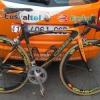Heres a new study below. It's interesting that when you raise the temperature of calorie restricted mice they are less resistant to cancer. Could this be one the reasons as I mentioned a few months ago of resveratrol failure to extend lifespan significantly?
FASEB J. 2008 Dec 4.
Resveratrol treatment in mice does not elicit the bradycardia and hypothermia associated with calorie restriction.
Mayers JR, Iliff BW, Swoap SJ.
*Department of Biology, Williams College, Williamstown, Massachusetts, USA.
Dietary supplementation with resveratrol may produce calorie restriction-like effects on metabolic and longevity endpoints in mice. In this study, we sought to determine whether resveratrol treatment elicited other hallmark changes associated with calorie restriction, namely bradycardia and decreased body temperature. We found that during short-term treatment, wild-type mice on a calorie-restricted diet experienced significant decreases in both heart rate and body temperature after only 1 day whereas those receiving resveratrol exhibited no such change after 1 wk. We also used ob/ob mice to study the effects of long-term treatment because previous studies had indicated the therapeutic value of resveratrol against the linked morbidities of obesity and diabetes. After 12 wk, resveratrol treatment had produced no changes in either heart rate or body temperature. Strikingly, and in contrast to previous findings, we found that resveratrol-treated mice had significantly reduced endurance in a treadmill test. Quantitative reverse transcriptase-polymerase chain reaction suggested that a proposed target of resveratrol, Sirt1, was activated in resveratrol-treated ob/ob mice. Thus, we conclude that the bradycardia and hypothermia associated with calorie restriction occur through mechanisms unaffected by the actions of resveratrol and that further studies are needed to examine the differential effects of resveratrol in a leptin-deficient background.-Mayers, J. R., Iliff, B. W., Swoap, S. J. Resveratrol treatment in mice does not elicit the bradycardia and hypothermia associated with calorie restriction.
Edited by Matt, 07 December 2008 - 04:56 PM.















































